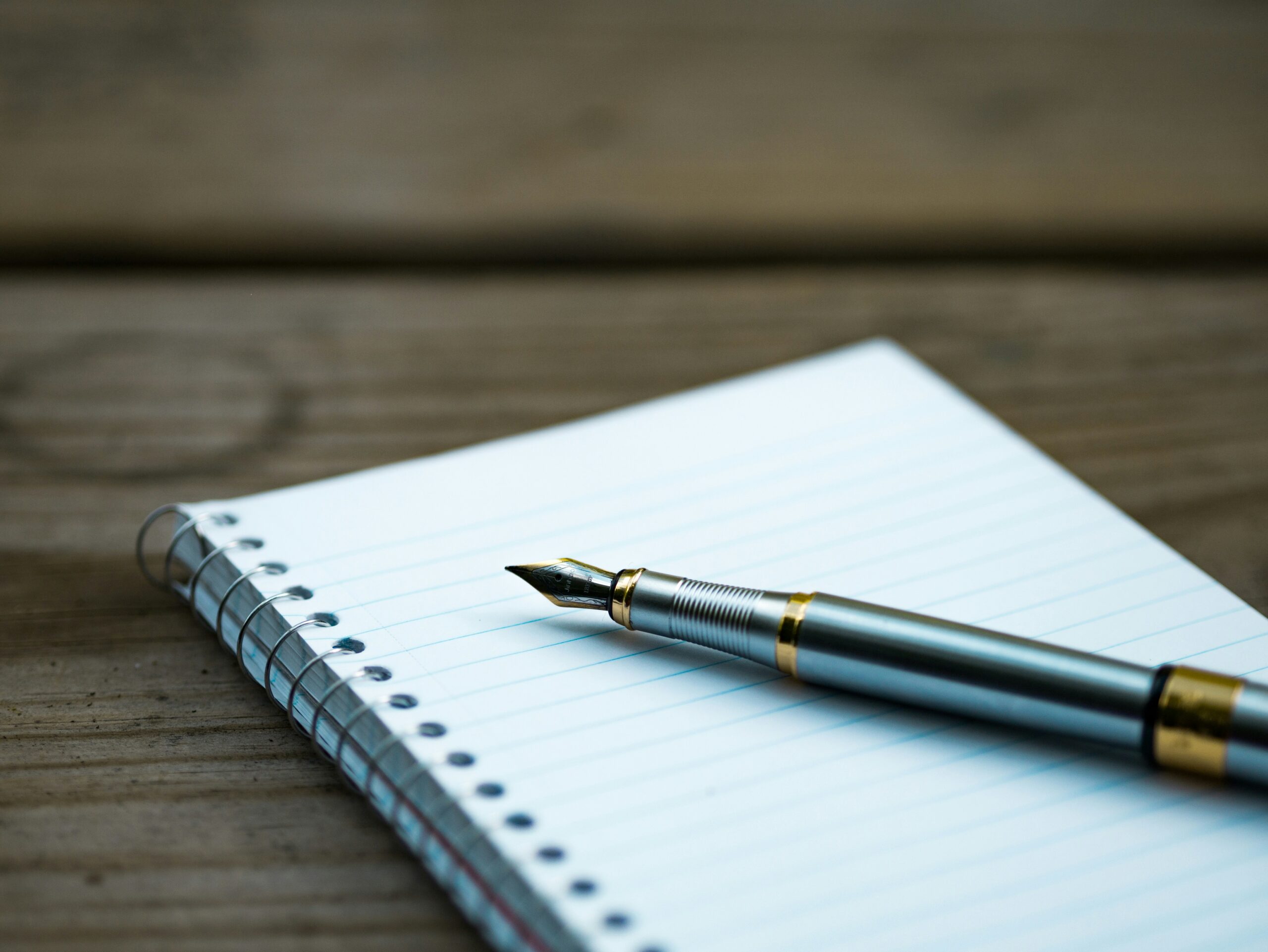I’m a big believer in the power of the handwritten word. I do the majority of my journaling by hand in a bound Blueline notebook. I’ve experimented with different methods of journal writing, from stacks of loose-leaf paper to password-protected online documentation. I get the best results writing by hand.
Journaling is a powerful tool that everyone can benefit from, so I encourage you to do it however works best for you. The most important part of keeping a journal is keeping it. Writing by hand is my method of choice for several reasons, which I’ll outline here. Give it a try and see if you experience the same benefits.
1. Visual feedback
Flipping through my notebooks, it is evident immediately what mood dominated a writing session. Some pages are filled with neat block letters made by my Pilot Precise V7 black roller pen. Others are smudged with uneven scrawl because my hands were frozen from riding my scooter to the cafe without gloves – evidence I was out of sorts enough to forget details like protecting myself from the elements.
Most cherished, perhaps, are the pages scribbled frantically with a foreign pen – the urgency transparent – stranded somewhere without my usual writing instrument. Perched atop a toilet in the restroom of a restaurant, or writing excitedly in the closet of a sleeping lover.
Small illustrations beginning an entry, a polka-dotted dateline betraying my playful mood that morning. Or deep, heavy lines with hasty smudges as I wrote angrily without giving the ink time to dry. None of these qualities are evident in typing. The CAPS LOCK key forms a clumsy catch-all for emotion and lacks the subtlety of handwriting.
In between pages are detritus of daily living – ticket stubs, postcards, polaroids, parking meter receipts. Anything stamped with the date or documenting the location. I was here.
2. Quality control
The rhythm of writing by hand affords you the opportunity to weigh and measure your words, choose them carefully, all without interrupting the flow. Your words become more artful. Sometimes I find typing mechanical and ejaculatory. Bursts of prose interrupted by long pauses of thought. The seamless, graceful dance of words is lost.
3. Brain exercise
I can type over 100 words a minute. When writing by hand, I need to hold onto my thoughts long enough to get them down on paper. This practice stretches my synapses and exercises my brain. It seems to bolster my failing short-term memory.
4. Accessibility
From a practical standpoint, keeping a paper journal means I never have an excuse for evading my dedication to the page. No dead batteries will keep me from pouring my heart out. No crashed hard drives will swallow pages of text. I don’t have to wait for my desktop to boot up, or remember to drag my laptop with me in case the opportunity to write arises. A small bound notebook is easily pocketed and needs no electricity to survive. It makes airport travel much easier, as well – Homeland Security does not require the removal of my journal for inspection!
5. Indulging a Paper Fetish
I love stationery. I mean, really love it. The more often I write, the more frequently I get to take field trips to Utrecht, Papyrus, Paper Zone or the University Bookstore.
6. The Tetris Effect
Writing by hand moves a different part of my brain than typing. Like drawing, it seems to jiggle the more creative synapses of grey matter, perhaps because of the similiar hand movements and contact with pen and paper.
I could hypothesize this has something to do with the primal method of writing on cave walls before the invention of literature. Deep down, I’m a cavewoman scratching pictures in the red clay with an arrow head. To keep the controversy to a minimum, I just call this the Tetris Effect.
Playing Tetris wakes up a different part of my brain. The part that does math. The part put out of a job with the invention of the calculator and my escape from school. Like playing Tetris, writing by hand wakes up a specific part of my brain. It’s good to exercise mental muscles you don’t normally use during your day. (Especially if you don’t have to do math to exercise them.)
The Intangible and the Digital
Beyond all that measurable stuff, there is an inexplicable chemistry that takes place when I behold a blank page, pen in hand. I can’t fully explain it, but if you try journaling by hand for a little while, you may see what I mean. It connects you to your thoughts more intimately.
For a period of time, I wrote a great deal on my computer. This is partly because I worked at a bank, where my job description involved sitting at my computer and looking busy. I didn’t have internet access, but I had email. So I would write long journal-type emails and send them to myself for the timestamp.
I have hundreds of these emails from that time, collectively called the “Interstate Archive.” I read them now, and even the emotional ones lack the impact possessed by my handwritten journals from the same time period. The flow is different, the narrative removed and less connected. It reads like a science experiment rather than a field guide.
I am, however, grateful to have these journal entries, as the alternative was not writing at all. Had I spent the same amount of time crouched over my notebook, my employment would’ve been short-lived.
Excuses, Excuses
Aside from the logistics, you may have the following excuses for not wanting to keep a paper-based journal:
You hate your handwriting.
I’ve actually used journal writing to experiment with and improve my handwriting. For awhile I kept my journal in cursive script. Then I switched to standard print, sentence case. I went through a paranoid phase where I wrote in shorthand so nobody could read it.
Now I write in blocky capitals, my handwriting increasingly legible as the years go by. It doesn’t really matter what your handwriting looks like, because much of the magic of journaling is the process, not the product.
You can’t spell.
Me niether. Good thing nobody else reads my journals.
Your grammar sucks.
(see above)
You are afraid someone will read your journal.
Privacy is a big concern for lots of people. I have a messenger bag that I am rarely without, and my journal stays inside it at all times unless I’m writing in it. My 100+ completed journals are protected by my refusal to live with someone I don’t trust implicitly. (I’ve made it very clear what’s off limits.)
As a last line of defense, most snoopers would be bored to tears three pages in and abandon the stealth mission anyway. My life is just not that interesting.
I explore this topic in depth in Keeping Your Journal Private.
Writing by hand takes too long.
Many people type faster than they write by hand. But the slower pace moves a different part of your brain. You may find advantages to the slackened timeline, such as higher quality control or improved brain power.
Electronic journaling certainly has its benefits, which I explore in the Benefits of Digital Journaling. Before you dedicate yourself to one method or the other, try them out. Maybe, like me, you’ll find a use for both – depending on the type of writing you need to do.
Use the method that gets you closer to where you want to be!



